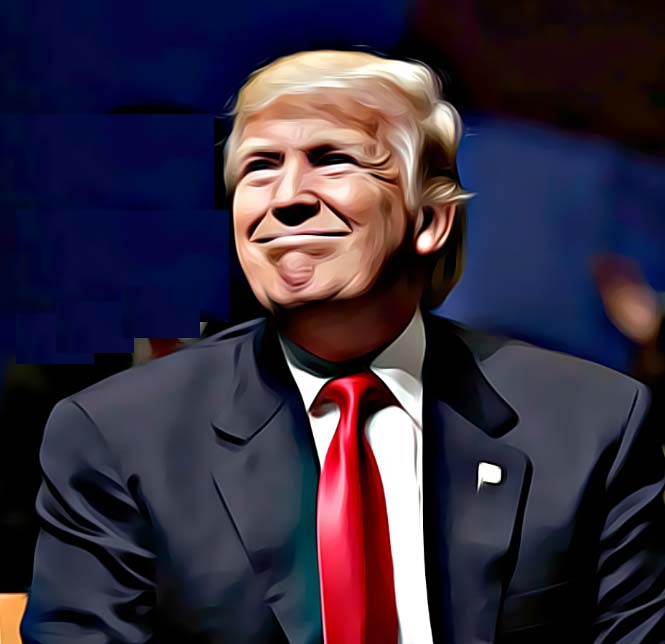It's getting to the point where it'll be easier to list the Democrats who are not running for president in 2020. But the roster on the Republican side remains a minority of one.
That may change. As Jonathan Last of The Bulwark notes, primary challenges of sitting presidents are more normal than many think. Of the nine sitting presidents who've sought re-election since 1964, five faced opponents from their own party.
More significantly, there's ample demand for a primary challenge. A new NPR-PBS-Marist poll found that Republicans are essentially divided evenly on the question. Asked if they'd like to see a challenge, 44 percent of respondents said they'd like to see a challenge, 45 percent said no, and 11 percent said they were unsure.
This doesn't necessarily mean that nearly half of all Republicans want to see Trump defeated in the primaries. According to a recent Des Moines Register poll, Trump has an 81 percent approval rating among registered Republicans in Iowa, and 67 percent of them say they'd vote to re-elect him.
But almost as many Republicans (63 percent) said they would welcome a challenger in the Iowa caucuses. Polls show similar attitudes in New Hampshire.
For Trump's biggest fans, this is crazy talk. But most of Trump's biggest fans are old, and they tend to rely on traditional conservative media outlets for their understanding of the political landscape.
Among young people generally, Trump's approval rating hovers at around 30 percent. Last year, an Axios survey found that more than 80 percent of Republicans and Republican "leaners" between the ages of 18 and 24 wanted to see Trump challenged in a primary, compared with 74 percent of Republicans over the age of 65. According to the NPR-PBS-Marist poll, a majority of Republicans under the age of 45 would like to see a Republican challenge Trump.
Writing for the Weekly Standard last year, Ben Shapiro argued that this generational chasm can be attributed in part to young conservatives being more idealistic than the old folks who now care more about "winning" than getting hung up on ideology. "Older conservatives judge Trump on his politics; younger conservatives judge Trump on his values," Shapiro wrote.
Also, young conservatives haven't self-sorted yet. They have to socialize and work with a more diverse and urban America than the older -- and often retired -- Republicans in more suburban or rural communities.
That means young conservatives are constantly asked to defend Trump's statements and behaviors, which the oldsters can just write off or laugh at. As a conservative, this is a reason for optimism about the future of conservatism after Trump.
I'm focusing on young people because the traditional route for a primary challenger is almost surely foreclosed by Trump's fervent obsession with holding on to his base. Typically the threat to a sitting president comes from the populist ranks of the base: Patrick Buchanan's attack on George H.W. Bush, for instance, and even Ross Perot's.
While Trump's offer to end the partial government shutdown by trading concessions on the so-called Dreamers for wall funding has angered the likes of Ann Coulter, it's still unlikely that crowd would support a primary opponent.
But there is the Sen. Eugene McCarthy model. In 1968, McCarthy (D-Minn.) opposed Lyndon Johnson in the New Hampshire Democratic primary. He lost, but he did well enough to force Johnson out of the race. His campaign relied on young, idealistic college students who got "clean for Gene" by shaving off their beards and cutting their hippie hair.
Trump probably wouldn't react the way LBJ did. But the incentives for a young Republican looking to be a standard-bearer and leader of the future are strong.
The media would lavish coverage on a GOP primary fight. Moreover, once a challenger steps in, the chances that an even bigger name would join the fray, as Robert Kennedy did in 1968, improve, particularly if an unknown starts to show the slightest traction.
There are other scenarios. If Trump's approval rating drops even more, because of special counsel Robert Mueller's probe or a faltering economy, it could open a path for a slew of Republicans seeking the nomination to save the party from a 2020 Democratic landslide, which seems increasingly possible.
We're not there yet. But if a lot of those older Republicans like winning, they might be convinced to back a candidate with a better chance of doing that.
Every weekday JewishWorldReview.com publishes what many in the media and Washington consider "must-reading". Sign up for the daily JWR update. It's free. Just click here.
(COMMENT, BELOW)
Jonah Goldberg is a fellow at the American Enterprise Institute and editor-at-large of National Review Online.



 Contact The Editor
Contact The Editor
 Articles By This Author
Articles By This Author